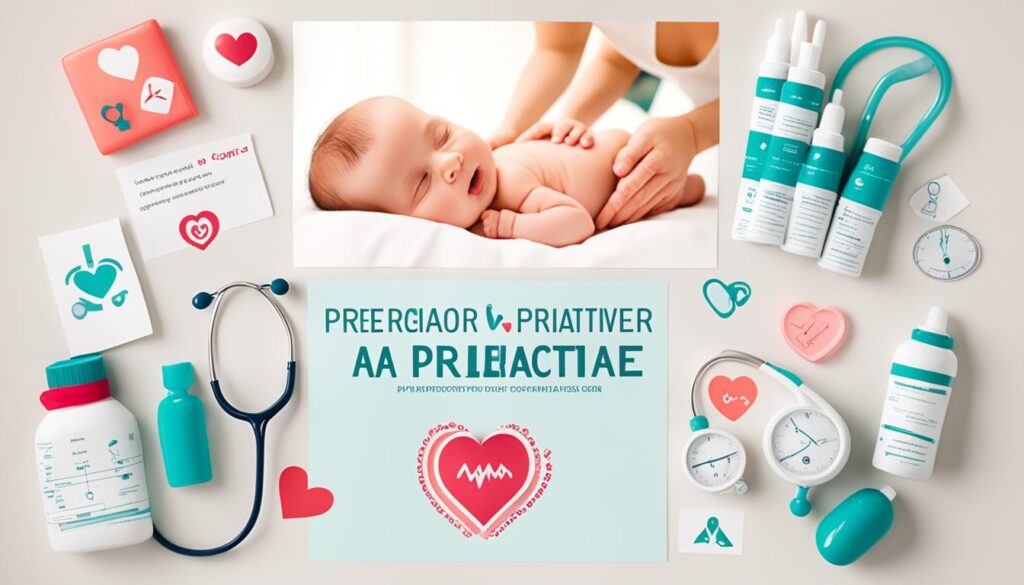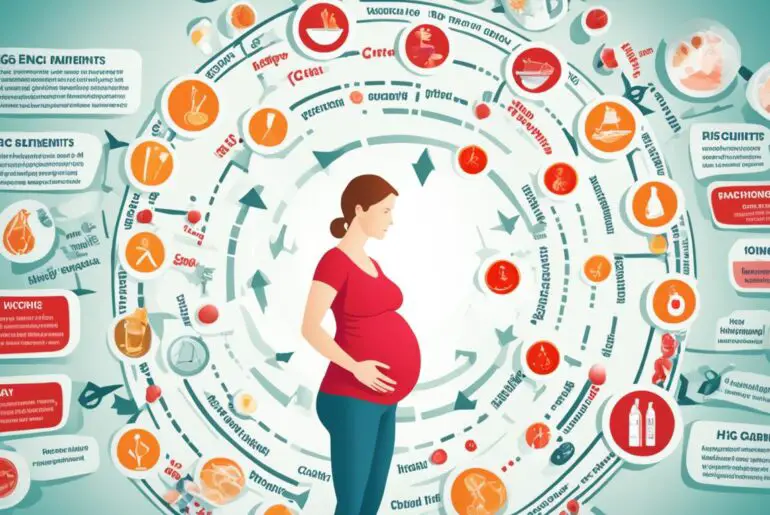Did you know that the use of HCG diet supplements during pregnancy can pose serious risks to both the mother and the baby? Many women turn to these supplements in their quest for weight loss, unaware of the potential dangers they may be exposing themselves to. In this article, I will discuss the importance of safe HCG supplements, maintaining a healthy pregnancy, and the risks associated with the HCG diet during pregnancy.
Key Takeaways:
- Over-the-counter HCG products have not been proven to be safe or effective for weight loss during pregnancy.
- Severe calorie restriction and hormonal imbalances associated with the HCG diet can negatively impact maternal health.
- A balanced and nutrient-rich diet, prenatal care, and regular exercise are essential for a healthy pregnancy.
- Consultation with a healthcare provider is crucial to ensure personalized guidance and support throughout pregnancy.
- Pregnant women should seek reliable sources of information and support to make informed decisions about their health.
The Risks of the HCG Diet during Pregnancy
The HCG diet during pregnancy poses significant risks to maternal health and the development of the baby. This controversial weight-loss method involves severe calorie restriction, typically only allowing 500-800 calories per day. Such an extreme reduction in caloric intake is not adequate to support a healthy pregnancy.
The HCG hormone, naturally produced during pregnancy, plays a crucial role in enhancing fertility. However, using HCG supplements during pregnancy is strongly advised against due to potential adverse effects. The delicate balance of hormones in the body during pregnancy is essential for the well-being of both the mother and the developing baby. Introducing additional HCG hormone through supplements can disrupt this balance and lead to complications.
Severe calorie restriction combined with hormonal imbalances from HCG supplements can have detrimental effects on maternal health. This includes an increased risk of blood clots and the promotion of certain types of cancers. It is crucial for pregnant women to prioritize their well-being and support the healthy development of their baby by focusing on a balanced and nutrient-rich diet.
Avoiding the HCG diet during pregnancy and opting for a more appropriate diet plan is essential for the health and safety of both the mother and the baby. It is vital to consult with a healthcare provider to develop a personalized plan that ensures the nutritional needs of the mother and promotes a healthy pregnancy.
Key Risks of the HCG Diet during Pregnancy:
- Inadequate caloric intake to support a healthy pregnancy
- Potential disruption to the delicate hormonal balance
- Increased risk of blood clots
- Promotion of certain types of cancers
It is crucial to prioritize the well-being of both the mother and the baby by avoiding the HCG diet during pregnancy and embracing a balanced and nutrient-rich diet.
Alternative Approaches to Healthy Pregnancy

When it comes to maintaining a healthy pregnancy, relying on the HCG diet may not be the best option. Instead, there are safer and more beneficial approaches that pregnant women can consider. These alternatives prioritize a well-rounded diet, natural supplements, prenatal care, regular exercise, and adequate rest.
1. Well-Rounded Diet: A balanced diet plays a crucial role in supporting a healthy pregnancy. Pregnant women should focus on consuming a variety of fruits, vegetables, whole grains, lean proteins, and healthy fats. This helps ensure that both the mother and the baby receive essential nutrients for growth and development.
2. Natural Supplements: In addition to a healthy diet, natural supplements specifically formulated for pregnancy can be beneficial. These supplements can provide additional nutrients that may be lacking in a woman’s diet, under the guidance of a healthcare provider. Some commonly recommended natural supplements for pregnancy include:
- Folic acid: Supports the baby’s neural tube development.
- Iron: Helps prevent anemia and supports red blood cell production.
- Calcium: Essential for building strong bones and teeth.
- Omega-3 fatty acids: Promote brain and eye development in the baby.
It is important to consult with a healthcare provider before starting any new supplement regimen during pregnancy.
3. Prenatal Care: Regular prenatal check-ups and consultations with a healthcare provider are essential for monitoring the well-being of both the mother and the baby. These visits allow for early detection and management of any potential complications, ensuring the best outcomes for both.
4. Regular Exercise: Staying physically active during pregnancy can help improve overall health and promote a smoother labor and delivery. Moderate exercise, such as walking, swimming, or prenatal yoga, can help maintain a healthy weight, reduce discomfort, and improve mood and energy levels. However, it is important to consult with a healthcare provider before starting or continuing any exercise routine during pregnancy.
5. Adequate Rest: Getting enough rest is crucial for the well-being of both the mother and the baby. Pregnancy can be physically and emotionally demanding, so it is important to prioritize sleep and relaxation. Taking short naps, practicing relaxation techniques, and listening to the body’s needs can help ensure sufficient rest throughout the pregnancy journey.
To support a healthy pregnancy, alternative approaches encompass a well-rounded diet, natural supplements, prenatal care, regular exercise, and adequate rest. These methods prioritize the overall well-being of both the mother and the developing baby. By adopting these alternatives, pregnant women can optimize their health and nurture the growth and development of their little one.
Note: Image depicts natural supplements for pregnancy, supporting the topic of alternative approaches to a healthy pregnancy.
Consultation with Healthcare Provider
Before considering any weight loss or dietary changes during pregnancy, it is crucial for expecting mothers to consult with their healthcare provider. As a pregnant woman, you need personalized guidance on maintaining a healthy pregnancy and optimizing the well-being of both yourself and your baby. Your healthcare provider is your best resource for accurate information and advice tailored to your specific needs, concerns, and goals.
During your consultation, you can discuss various aspects of your pregnancy, including the HCG diet and pregnancy. Your healthcare provider can provide insights into the safety of safe HCG supplements during pregnancy and advise you on pregnancy diet guidelines to ensure adequate nutrition for both you and your baby.
Professional guidance is essential because every pregnancy is unique, and what may be safe for one woman may not be suitable for another. Consulting with your healthcare provider allows you to make informed decisions based on your individual circumstances and medical history.
Here are some key areas where your healthcare provider can offer valuable insights:
- Nutrient Intake: Pregnancy requires increased nutrient intake to support the growth and development of your baby. Your healthcare provider can guide you in consuming a well-balanced diet that provides essential vitamins, minerals, and other nutrients necessary for a healthy pregnancy.
- Weight Management: Your healthcare provider can help you establish appropriate weight gain goals during pregnancy based on your pre-pregnancy weight and overall health. They can provide guidance on maintaining a healthy weight and avoiding excessive weight gain, as well as offer tips for managing any existing weight-related concerns.
- Supplement Usage: Some pregnant women may require additional supplementation to meet their nutritional needs. Your healthcare provider can advise you on the use of safe HCG supplements or other prenatal vitamins if necessary.
“Consulting with your healthcare provider allows you to make informed decisions based on your individual circumstances and medical history.”
Your healthcare provider is your partner in ensuring the well-being of both you and your baby. They can address any questions or concerns you may have and offer ongoing support throughout your pregnancy journey. Prioritizing regular prenatal check-ups and open communication with your healthcare provider is vital for a healthy and successful pregnancy.
| Benefits of Consulting with a Healthcare Provider during Pregnancy | Risks of Neglecting Professional Guidance |
|---|---|
| Personalized advice tailored to your specific needs and goals | Potential adverse effects of unverified weight loss methods during pregnancy |
| Access to accurate and evidence-based information on pregnancy nutrition | Risk of nutrient deficiencies and inadequate fetal development due to improper diet |
| Ongoing support and monitoring of your health and the baby’s well-being | Possible complications and health risks associated with unmonitored weight loss |
Remember, your healthcare provider is your trusted source of guidance throughout your pregnancy. By consulting with them, you can ensure you are taking the necessary steps to maintain a healthy pregnancy and give your baby the best start in life.
Risks and Benefits of HCG Therapy for Fertility

While the HCG hormone can be used for fertility treatments, it should not be confused with the HCG diet. HCG therapy, under the guidance of a healthcare provider, can help stimulate egg production and increase the chances of getting pregnant. However, it is important to weigh the risks and benefits of HCG therapy for fertility on an individual basis. Factors such as overall health, pre-existing conditions, and medical history should be taken into consideration.
“The effects of HCG therapy may vary depending on the individual’s circumstances,” explains Dr. Samantha Johnson, a reproductive specialist at Fertility Solutions Clinic. “While it can be an effective option for some couples, it may not be suitable for everyone.”
Before starting any fertility treatment, it is crucial to have a thorough consultation with a reproductive specialist or fertility consultant. They will assess your medical history, perform necessary tests, and provide personalized guidance based on your individual circumstances. This ensures that the risks and benefits of HCG therapy for fertility are carefully evaluated and aligned with your specific needs and goals.
Potential Benefits of HCG Therapy
When used appropriately and under the supervision of a healthcare professional, HCG therapy can offer several potential benefits for fertility:
- Stimulation of egg production: HCG stimulates the ovaries to produce mature eggs, increasing the chances of successful fertilization and pregnancy.
- Regulation of menstrual cycle: HCG can help regulate irregular menstrual cycles, optimizing the timing for conception.
- Enhanced embryo implantation: HCG therapy may improve the likelihood of successful embryo implantation in the uterine lining.
These potential benefits make HCG therapy a valuable option for couples struggling with infertility. However, it is important to remember that the effectiveness of HCG therapy may vary depending on individual factors and underlying causes of infertility.
Potential Risks of HCG Therapy
While HCG therapy can offer benefits for fertility, it is essential to be aware of potential risks and side effects. These risks may include:
- Ovarian hyperstimulation syndrome (OHSS): In rare cases, HCG therapy may lead to OHSS, a condition characterized by enlarged ovaries and fluid accumulation in the abdomen. Severe cases may require medical intervention.
- Multiple pregnancies: HCG therapy can increase the chances of conceiving multiple embryos, leading to a higher risk of multiple pregnancies.
- Other side effects: Some individuals may experience mild side effects such as breast tenderness, mood swings, and bloating. These side effects are typically temporary and subside on their own.
It is crucial to discuss the potential risks and side effects with your healthcare provider and weigh them against the benefits of HCG therapy. They can provide you with comprehensive information and guide you in making an informed decision based on your unique circumstances.
“The decision to undergo HCG therapy for fertility is a personal one that should be made in collaboration with your healthcare provider,” advises Dr. Johnson. “Together, we can assess your fertility goals, consider the risks and benefits, and determine the best course of action.”
Ultimately, the risks and benefits of HCG therapy for fertility should be carefully evaluated on an individual basis. Open communication with your healthcare provider and seeking expert advice are essential for making informed decisions regarding fertility treatment options.
Importance of Pre-Pregnancy and Post-Pregnancy Planning
Planning for pregnancy is an important step towards ensuring a healthy journey for both mother and baby. Pre-pregnancy planning involves taking proactive measures to optimize health factors and create the best possible environment for conception and pregnancy. It includes various aspects such as achieving a healthy weight, managing underlying health conditions, and addressing any potential fertility concerns. By taking these steps, women can increase their chances of a successful and healthy pregnancy.
Equally important is post-pregnancy care, which focuses on the recovery period after childbirth. This phase involves supporting the mother’s physical and emotional well-being as she adjusts to the changes that come with becoming a new parent. Post-pregnancy care covers a range of essential areas such as postpartum recovery, breastfeeding support, and self-care practices.
One of the key elements of pre-pregnancy and post-pregnancy planning is maintaining a nutrient-rich diet. A balanced and healthy diet, rich in vitamins, minerals, and other essential nutrients, plays a vital role in ensuring a healthy pregnancy and supporting the overall well-being of both mother and baby. It is also important to engage in regular exercise to keep the body strong and flexible throughout pregnancy and after childbirth. Additionally, incorporating holistic self-care practices such as relaxation techniques and stress management can help promote a positive and healthy mindset.
“Taking proactive steps to plan for pregnancy and prioritize post-pregnancy care can significantly impact the health and well-being of both mother and baby.”
By focusing on pre-pregnancy planning and post-pregnancy care, women can set a strong foundation for a healthy pregnancy and ensure their own well-being as they embark on the journey of motherhood. Consulting with healthcare providers, such as obstetricians or midwives, can provide valuable guidance for personalized planning and care.
Remember, each pregnancy is unique, and seeking professional support is essential to address individual needs and concerns. By taking proactive steps and prioritizing pre-pregnancy and post-pregnancy care, women can greatly enhance their chances of a healthy and fulfilling pregnancy experience.
Partnering with a Healthcare Provider for Comprehensive Care

When it comes to prenatal care and women’s health during pregnancy, partnering with a trusted healthcare provider is essential for comprehensive care. These professionals specialize in providing expert guidance on various aspects of pregnancy, including diet, exercise, weight management, and overall well-being. They play a crucial role in monitoring the health of both the mother and the baby through regular prenatal check-ups, screenings, and tests.
Establishing a trusting and collaborative relationship with a healthcare provider is important starting from the preconception period and continuing throughout pregnancy and beyond. They can provide personalized care and support, taking into account individual needs, concerns, and medical history. Having a healthcare partner during this journey ensures that appropriate steps are taken to prioritize the health and well-being of both the expectant mother and the baby.
Guidance on Diet and Exercise
One of the key roles of a healthcare provider is offering guidance on maintaining a healthy diet and exercise routine during pregnancy. They can help create a pregnancy-specific nutrition plan that provides the necessary nutrients for both the mother and the developing baby. Additionally, they can suggest appropriate exercises and modifications to support a safe and active lifestyle during pregnancy.
Weight Management and Monitoring
Healthcare providers are equipped to monitor weight gain throughout pregnancy and provide guidance on healthy weight management. They ensure that the expectant mother gains an appropriate amount of weight based on individual factors, promoting a healthy pregnancy outcome. Regular weight monitoring helps identify any potential concerns and allows for timely interventions if necessary.
Addressing Women’s Health Concerns
In addition to prenatal care, healthcare providers also address any women’s health concerns that may arise during pregnancy. This includes managing pre-existing medical conditions, addressing discomfort or complications, and providing support for emotional and mental well-being. They offer a comprehensive approach to address all aspects of a woman’s health during this transformative period.
Partnering with a healthcare provider who specializes in prenatal care and women’s health ensures access to expert guidance and personalized care throughout the journey of pregnancy. Regular check-ups, open communication, and collaboration foster a supportive healthcare partnership that prioritizes the well-being of both the mother and the baby.
Seeking Reliable Information and Support
During pregnancy, it’s crucial for expecting mothers to have access to reliable resources and support systems to ensure a smooth and healthy journey. By seeking guidance from trusted sources, you can find the information you need to navigate the various aspects of pregnancy, from health and nutrition to overall well-being. Here are some key avenues to explore:
Healthcare Providers
Your healthcare provider, whether it’s an obstetrician, midwife, or family doctor, is an invaluable resource throughout your pregnancy. They have the knowledge and experience to answer your questions, provide evidence-based advice, and monitor your health and the development of your baby. Regular check-ups and consultations with your healthcare provider will help ensure that you receive personalized care tailored to your specific needs.
Reputable Websites
When it comes to gathering information about pregnancy, turn to reputable websites that provide accurate and up-to-date content. Look for websites that are run by medical professionals or established organizations within the healthcare field. These websites often offer comprehensive guides on pregnancy health, nutrition, exercise, and other important topics. Remember to critically evaluate the information you find and cross-reference it with other trusted sources.
Prenatal Education Programs
Attending prenatal education programs can empower you with knowledge and skills to navigate pregnancy more confidently. These programs are typically offered by hospitals, community centers, or birthing centers and cover topics such as childbirth preparation, breastfeeding, newborn care, and postpartum support. Prenatal education programs allow you to connect with other expecting mothers, share experiences, and learn from qualified healthcare professionals.
Support Groups
Joining support groups for expecting mothers can provide you with a sense of community and emotional support. Connecting with other women who are going through similar experiences can be comforting and reassuring. Online forums, social media groups, or in-person gatherings can help you bond with other women, share advice, and seek guidance during this transformative time in your life.
By seeking reliable information and building a strong support network, you can navigate your pregnancy with confidence and peace of mind. Remember to consult with your healthcare provider for personalized guidance and recommendations tailored to your unique needs.
Conclusion
Based on the available evidence, it is not recommended to use HCG diet supplements during pregnancy. The safety and effectiveness of these supplements have not been established, and their use can pose risks to maternal health and baby development. Severe calorie restriction and hormonal imbalances associated with the HCG diet may have adverse effects.
Instead, pregnant women should prioritize a balanced and nutrient-rich diet, prenatal care, and regular exercise to support a healthy pregnancy. Consulting with a healthcare provider is crucial for personalized guidance tailored to individual needs and circumstances.
By partnering with a healthcare provider and focusing on maintaining overall well-being, expecting mothers can ensure the best possible outcomes for themselves and their babies. It is essential to prioritize the health and safety of both the mother and the developing baby throughout the pregnancy journey.
FAQ
Are HCG diet supplements safe to use during pregnancy?
No, HCG diet supplements are not safe to use during pregnancy. The Food and Drug Administration (FDA) advises against using over-the-counter HCG products for weight loss during pregnancy, as they have not been proven to be safe or effective.
What are the risks of following the HCG diet during pregnancy?
Following the HCG diet during pregnancy can pose risks to maternal health and baby development. Severe calorie restriction and hormonal imbalances associated with the diet can negatively impact maternal health, increase the risk of blood clots, and promote the growth of certain types of cancers.
What are some alternative approaches to maintaining a healthy pregnancy?
Instead of relying on the HCG diet, pregnant women should focus on consuming a balanced and nutrient-rich diet, engaging in regular exercise, and incorporating natural supplements specifically formulated for pregnancy, under the guidance of their healthcare provider.
Is it important to consult with a healthcare provider during pregnancy?
Yes, it is crucial to consult with a healthcare provider during pregnancy. They can provide personalized guidance on diet, exercise, weight management, and overall well-being to ensure the safety and well-being of both the mother and the developing baby.
What are the risks and benefits of HCG therapy for fertility?
HCG therapy, when used under the guidance of a healthcare provider, can help stimulate egg production and increase the chances of getting pregnant. However, it is important to weigh the risks and benefits of HCG therapy for fertility on an individual basis, taking into consideration factors such as overall health and medical history.
Why is pre-pregnancy and post-pregnancy planning important?
Pre-pregnancy planning involves optimizing health factors and addressing any potential fertility concerns, while post-pregnancy planning focuses on recovery, breastfeeding support, and adjusting to the physical and emotional changes after childbirth. Both stages are crucial for a healthy pregnancy journey.
How important is it to partner with a healthcare provider for comprehensive care during pregnancy?
Partnering with a healthcare provider who specializes in prenatal care and women’s health is essential for comprehensive care throughout pregnancy. They can provide guidance on various aspects of pregnancy, including diet, exercise, weight management, and overall well-being.
Where can I find reliable information and support during my pregnancy?
It is important to seek out reliable sources of information and support during pregnancy. Trusted resources include healthcare providers, reputable websites, prenatal education programs, and support groups for expecting mothers.
What is the overall conclusion regarding HCG diet supplements and pregnancy health?
The use of HCG diet supplements during pregnancy is not recommended due to the lack of evidence for their safety and effectiveness. Pregnant women should prioritize a balanced and nutrient-rich diet, prenatal care, and regular exercise to support a healthy pregnancy journey.




